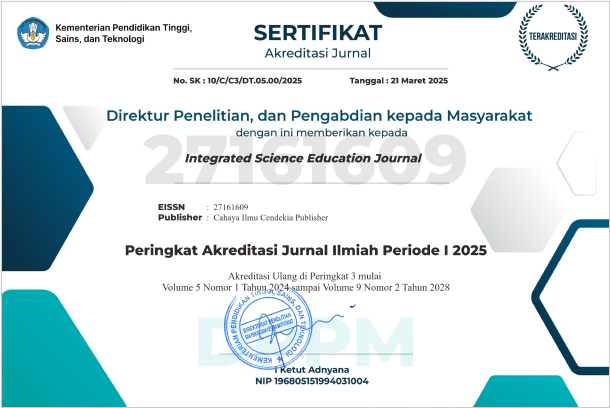Comparison of Student Learning Outcomes in Class VIII SMP Negeri 2 Muaro Jambi
Abstract
Purpose of the study: Knowing the comparison of student learning outcomes in grade 8 at SMP Negeri 2 Muaro Jambi based on the level of work character of the students.
Methodology: This study is a quantitative study, the study was conducted at SMP Negeri 2 Muaro Jambi Regency, the sample of the study was students of class VIII, data collection used a hard work questionnaire while the learning outcomes used question instruments.
Main Findings: Character education has a positive influence on student learning outcomes. One of the important characters is the character of hard work. Hard work character is a character to use all abilities to achieve maximum results. Based on research conducted on 58 students at State Middle School 2 Muaro Jambi, to determine the relationship between the character of hard work and student learning outcomes. Obtained character hard work has a positive impact on student learning outcomes. So the teacher can help students to be able to foster the character of hard work in each student. Moreover, the current curriculum puts forward character education. The teacher can give the character growth of hard work by providing examples of successful people who have a great will and work hard even though they do not have more ability to realize their dreams. Likewise in Islam, good character education can have an impact on all aspects of activities not only in the academic field but also in the non-academic field.
Novelty / Originality of this study: This study is the first to be conducted at a public junior high school in Muaro Jambi district to determine the comparison of student learning outcomes based on student learning outcomes.
References
A, Astalini “The Development Of Students Attitude Instrument Towards Mathematics Physics Class,” Edusains, vol. 10, no. 1, pp. 46-52, 2018.
M, Maison, “Student's Attitude Description Toward Physics On Secondary School,” Edusains, vol. 10. no.1, pp. 160-167, 2018.
Yediarani., R. Dita., M. Maison., and S. Ahmad, “Scientific Reasoning Abilities Profil Of Junior High School Students In Jambi,” Indonesian Journal Of Science And Education, vol. 3, no. 1, pp. 21-25, 2019.
M, Maison., A, Asrial., and S, Syaiful, Peningkatan Aktivitas Belajar Siswa Pada Materi Fisika Melalui Kegiatan Lesson Study Di Smp 17 Kota Jambi,” Jurnal Pengabdian Pada Masyarakat, vol. 30, no. 4, pp. 55-60, 2015.
Kurniawann. And Nurlailin., “Kedisiplinan Siswa Terhadap Objek Mata Pelajaran Ipa Di Smp Kabupaten Muaro Jambi”, In. Sci. Ed. J, vol. 1, no. 2, pp. 56-61, 2020.
T, Tanti; Jamaluddin, Jamaluddin; Syefrinando, Boby, “Pengaruh Pembelajaran Berbasis Masalah Terhadap Beliefs Siswa Tentang Fisika Dan Pembelajaran Fisika,” Jurnal Ilmiah Pendidikan Fisika Al-Biruni, vol. 6, no. 1, pp. 23, 2017.
T, Tanti, et al, “Exploring The Relationship Between Preservice Science Teachers’beliefs And Self-Regulated Strategies Of Studying Physics: A Structural Equation Model,” Journal Of Turkish Science Education, vol. 15, no. 4, pp. 79-92, 2018.
Maison., Syahrial., Syamsurizal., and Tanti, “Learning Environment, Students’ Beliefs, And Self-Regulation In Learning Physics: Structural Equation Modeling,” Journal Of Baltic Science Education, vol. 18, no. 3, pp. 389, 2019.
T, Tanti, et al, “Comparison Of Student Attitudes Toward Natural Sciences In Rural Middle Schools In Jambi Province,” Ta'dib, vol. 23, no. 1, pp. 63-74, 2020.
S, Sutinah. Metodologi Kuantitatif Dalam Penelitian Komunikasi. Scriptura, 2007.
N, Ningrum, “Pengaruh Penggunaan Metode Berbasis Pemecahan Masalah (Problem Solving) Terhadap Hasil Belajar Ekonomi Siswa Kelas X Semester Genap Man 1 Metro Tahun Pelajaran 2016/2017,” Promosi: Jurnal Program Studi Pendidikan Ekonomi, vol. 5, no. 2, 2017.
A, Bayu., Y, Upik., and R.S. Budiarti,”Pengaruh Model Pembelajaran Berbasis Masalah (Problem Based Learning) Terhadap Hasil Belajar Biologi Siswa Kelas X Sma N 3 Kota Jambi,’ Skripsi Jurusan Pendidikan Biologi Fakultas Keguruan Dan Ilmupendidikan Universitas Jambi, 2014.
T, Tanti, “Konstruksi Dan Validasi Bahan Ajar Fisika Berbasis Problem-Based Learning (Pbl) Untuk Meningkatkan Keterampilan Generik Siswa,” Journal Of Teaching And Learning Physics, vol. 5, no. 1, pp. 28-34, 2020.
Setyar. “Deskripsi Sikap Kesenangan Dalam Belajar Ipa, Ketertarikan Memperbanyak Waktu Belajar Ipa, Dan Ketertarikan Berkarir Di Bidang Ipa Di Mts Syifa’ul Qulub”, In. Sci. Ed. J, vol. 1, no. 1, pp. 41-45, 2020.
S, Sarmin., and A. B. Santoso, “Nilai Karakter Novel Sebelas Patriot Karya Andrea Hirata,” Linguista: Jurnal Ilmiah Bahasa, Sastra, Dan Pembelajarannya, vol. 1, no. 1, pp. 12-17, 2017.
Harahaps., “Identifikasi Kreativitas Siswa Terhadap Mata Pelajaran Ipa”, In. Sci. Ed. J, vol. 1, no. 1, pp. 18-24, 2020.
Lasmital., “Identifikasi Karakter Kerja Keras Dalam Mata Pelajaran Ipa Di Smpn 3 Batanghari”, In. Sci. Ed. J, vol. 1, no. 1, pp. 07-17, 2020.
Putri, Yelli Riska, et al, “Penerapan Model Discovery Learning Dengan Penugasan Portofolio Untuk Meningkatkan Kemampuan Argumentasi Siswa Smp,” Edu-Sains: Jurnal Pendidikan Matematika Dan Ilmu Pengetahuan Alam, vol. 8, no. 2, pp. 1-10, 2019.
M. Naswir., H. Haryanto., and F. Wati, “Analisis Keterlaksanaan Model Pembelajaran Inkuiri Terbimbing Untuk Materi Sifat Koligatif Larutan Dan Pengaruhnya Terhadap Kemampuan Berpikir Kreatif Siswa Kelas Xii Ipa Sma Islam Al-Falah Kota Jambi,” Journal Of The Indonesian Society Of Integrated Chemistry, vol. 9, no. 2, pp. 43-51, 2017.
H. Harizon., H. Haryanto., and A. Anisah,”Pengaruh Penerapan Model Pembelajaran Kooperatif Tipe Make-A Match Terhadap Hasil Belajar Siswa Pada Materi Larutan Elektrolit Dan Nonelektrolit Di Sma Pgri 2 Kota Jambi,” Journal Of The Indonesian Society Of Integrated Chemistry, vol. 8, no. 2, pp. 47-56, 2016.
Syamsurizal., and Haryanto, “Pengembangan E-Modul Berbasis Keterampilan Proses Sains Pada Materi Kesetimbangan Kimia Untuk Tingkat Sma,” Semirata 2015.
M. D. E. Wiwik., H. Haryanto., and S. Nababan, “Analisis penerapan model pembelajaran kooperatif numbered head together (nht) dan pengaruhnya terhadap hasil belajar siswa pada materi struktur atom di kelas x smkn 3 kota jambi,” Journal of the indonesian society of integrated chemistry, vol. 9, no. 1, pp. 45-53, 2017.
H. Haryanto., H. Harizon., and N. D. Ratih, “Pengembangan instrumen penilaian keterampilan proses dan sikap ilmiah pada materi termokimia kelas xi mia sma negeri 10 kota jambi,” journal of the indonesian society of integrated chemistry, vol. 8, no. 1, pp. 50-62, 2016.
A. Fujika.,E. Anggereini., and R. S.Budiarti, “Analisis kemampuan berpikir kritis siswa sma n 5 kota jambi melalui pembelajaran berbasis masalah pada konsep pencemaran lingkungan,” Biodik, vol. 1, no. 1, 2015.
V. S. Wps., R. S. Budiarti., and G. Gardjito, “analisis hambatan guru biologi pada implementasi kurikulum 2013 di kelas x mia sma negeri berakreditasi a se-kota jambi,” Biodik, vol. 2, no. 2, pp. 86-95, 2016.
L. V. Smolova, “Ssystematic thinking as a factor in implementing sustainable development. in: sustainability and the humanities,” springer, cham, pp. 443-454, 2019.
L. Kartina., S. Subani, “Aanalisis kemandirian siswa mts pada mata pelajaran ipa,” Schrödinger: journal of physics education, vol. 1, no. 1, pp. 30-35, 2020.
H. Harlis., and R. S. Budiarti, “Ppengembangan buku ajar alga pada mata kuliah taksonomi monera dan protista bagi mahasiswa pendidikan biologi,” Biodik, vol. 5, no. 3, pp. 215-224, 2020
R. S. Budiarti., et al, “Aanalisis kemampuan berpikir kritis siswa lintas minat pada pembelajaran biologi kelas x iis sma negeri 11 kota jambi,” Biodik, vol. 2, no. 1, 2016.
L A. Triwati, et al, “Pengembangan instrumen penilaian karakter pada pembelajaran biologi di sma negeri 1 demak,” 2015. phd thesis. universitas negeri semarang.
Copyright (c) 2021 Cahaya Ilmu Cendekia Publisher

This work is licensed under a Creative Commons Attribution-NonCommercial 4.0 International License.
Authors who publish with this journal agree to the following terms:
- Authors retain copyright and acknowledge that the Integrated Science Education Journal is the first publisher licensed under a Creative Commons Attribution 4.0 International License.
- Authors are able to enter into separate, additional contractual arrangements for the non-exclusive distribution of the journal's published version of the work (e.g., post it to an institutional repository or publish it in a book), with an acknowledgment of its initial publication in this journal.
- Authors are permitted and encouraged to post their work online (e.g., in institutional repositories or on their website) prior to and during the submission process, as it can lead to productive exchanges and earlier and greater citation of published work.







.png)
.png)






